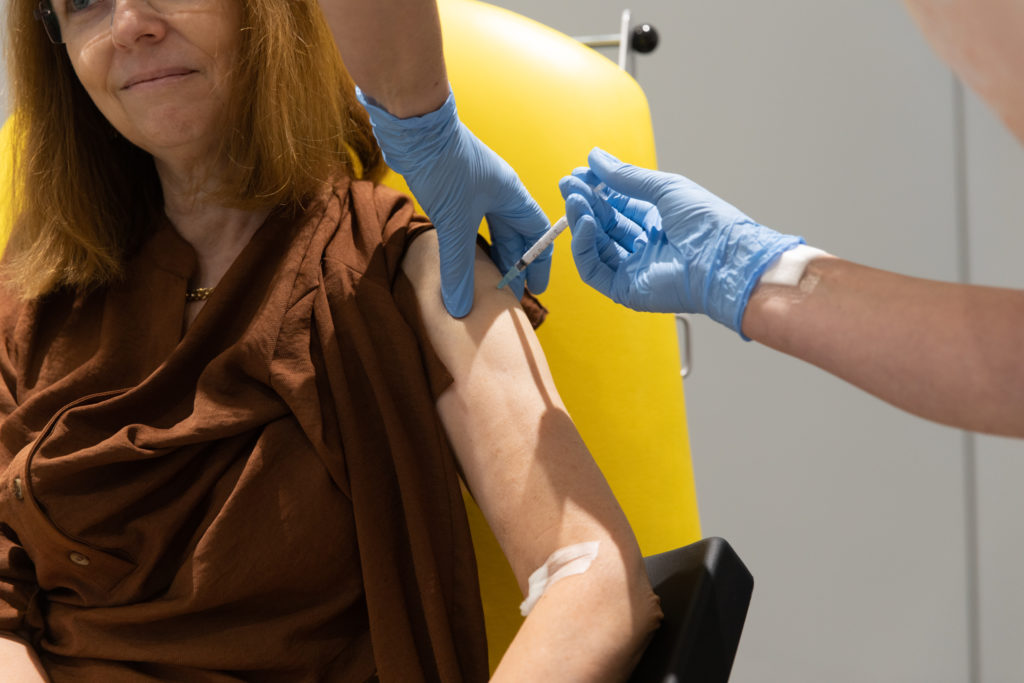NIHR Oxford BRC-supported health economics researchers have published a paper outlining the possible criteria that governments might use to prioritise who gets a COVID-19 vaccine once one has been approved for use.

The article – ‘How Should a Safe and Effective COVID-19 Vaccine be Allocated? Health Economists Need to be Ready to Take the Baton’ – was published today in the journal PharmacoEconomics Open.
The paper was written by researchers from the University of Oxford’s Health Economics Research Centre (HERC), in the Nuffield Department of Population Health.
They say that as well as developing clear criteria for who should be at the front of the queue for the new vaccine, many practical issues relating to the rolling out the implementation of the vaccine programme will need to be resolved before results of a vaccine randomised controlled trial are known.
Prioritisation of access is likely to be based on a number of criteria. These may include those that are greater risk of exposure to the virus, such as frontline health and social care workers or bus drivers.
But the criteria might also take into account the impact lockdown is having on the economy. The HERC team suggest there is an argument for considering productivity losses, not usually counted in the evaluation of vaccines for other diseases.
“This could conceivably mean giving a relatively high priority to young economically active people, or to teachers to enable children to safely return to schooling and their parents to return to work,” they say.
The paper notes that it is likely that at the time the results of a successful vaccine trial become known, most countries will have insufficient stockpiles to cover all those who would ideally be vaccinated.
The HERC team have developed a comprehensive framework to help governments distribute a vaccine effectively and fairly. They outline the necessary decisions governments must make regarding allocation of a vaccine. Key considerations must include:
- the health impacts of COVID-19
- reducing the rate of transmission
- allowing the economy to return to normal
- equity (particularly as COVID-19 has been shown to have disproportionate impacts on socially disadvantaged groups).
While there is a lot of emerging evidence about the impact COVID-19 is having on people’s health and the economy, there is a need to bring this together into an evidence-based framework for understanding the potential benefit of adopting different prioritisation strategies.
For example, when determining the degree to which those working in the retail and service sector should be prioritised for vaccination there is a need to take into account: (i) individual health benefits to staff; (ii) societal health benefits via lower transmission to shoppers; (iii) benefits to the economy (e.g. from allowing more shops to open).
Study co-author Dr Laurence Roope said: “Without a clear plan, governments may be forced into quick decisions and may not realise the full potential of a vaccine.
“Many governments rely on expert bodies involving clinicians, epidemiologists and health economists that use evidence to guide who should receive new medicines. It should be no different when allocating a COVID-19 vaccine.”
The study suggests that beyond synthesising evidence from research to determine the benefits of a vaccine, it is important that researchers and governments seek public opinion regarding several key aspects of the vaccine distribution:
- whether governments allow their citizens to purchase a vaccine privately, or solely via public channels such as the UK’s National Health Service (NHS). While most medicines can be purchased privately, the COVID pandemic is much more like a war-time situation and in the past vital goods in limited simply have been rationed.
- the degree to which a vaccination prioritisation strategy should be focused on health versus wider benefits such as facilitating a safe return to education, protecting jobs and the economy.
- whether governments should randomly allocate the vaccine if there is not enough vaccine available to cover all individuals assigned the same priority.
Professor Philip Clarke, Director of the HERC, said: “Engaging with the public by conducting nationally representative surveys would enable researchers and governments to better tailor vaccine strategies.
“Given the likelihood that vaccine supplies will be limited, there is a need for a transparent evidence-based framework for prioritising who gets preferential access to it.”
In the race for an effective COVID-19 vaccine, there is a need for governments, researchers and the public to think now about what happens after one of the vaccines crosses the finishing line.